2014 山东省泰安市中考英语真题及答案
本试卷分第 I 卷(选择题)和第Ⅱ卷(非选择题)两部分。第 I 卷 l 至 9 页,第Ⅱ卷 l0 至
12 页,共 120 分。考试时间 120 分钟。
第 I 卷(选择题 共 75 分)
B. You’re right.
C. Thank you.
第一部分听力(共 20 小题;每小题 1 分,满分 20 分)
(一)听句子,选择适当的应答语。每个句子读两遍。
1. A. Not at all.
2. A. 30 minutes.
3. A. I’m thirsty.
please.
4. A. All fight.
it,
5. A. That’s nice.
pleasure.
(二)听五段对话,选择正确答案。每段对话读两遍。你将有 20 秒钟的时间阅读下面 5 个
小题。
6. What is Tom good at?
B. You’d better have a rest.
B. The same to you.
B. Some orange juice.
C. Yes, a cake
C. I’m glad you like
B. 30 miles.
C. 30 kilos.
C.
With
A. Chinese.
B. Maths.
C. English.
7. What will the woman do?
A. She will do some reading.
B. She will change her clothes.
C. She will go to a party.
8. Where is the conversation taking place?
A. In a shop.
B. In a classroom.
C. In a restaurant.
9. What’s the possible relationship between the two speakers?
A. Teacher and student.
B. Doctor and patient.
C. Husband and wife.
10. How much will the woman pay for the socks?
A. Five dollars.
B. Ten dollars.
C. Two dollars.
(三)听两段长对话,选择正确答案。每段对话读两遍。你将有 25 秒钟的时间阅读下面 6
个小题。
听第一段对话,回答 11 至 13 小题。
11. What are they talking about?
A. Jim’s school.
B. Jim’s trouble.
C. Jim’s lunch.
12. Where are they talking?
A. At the doctor’s.
B. At Jim’s school.
C. At the teachers’
office.
13. What’s the matter with Jim?
A. He’s OK.
B. He’s got a fever.
C. He’s got a cold.
听第二段对话,回答 14 至 16 小题。
14. What is the woman looking for?
A. A police station.
B. A bank.
15. How can the woman get to the shoe shop?
C. A shoe shop.
A. Go down the street and take the fourth turning on the left.
�
B. Go down the street and take the fourth turning on the right.
C. Go down the street and take the second turning on the left.
16. Which of these is TRUE?
A. The shoe shop opens at 6:30 in the morning.
B. The man doesn’t remember the name of the bank.
C. The woman knows the city very well.
(四)听短文,回答下面四个问题,选择正确答案。短文读两遍。你将有 20 秒钟的时间阅
读下面 4 个小题。
17. When does Judy often watch TV?
A. On Sundays.
B. On weekdays.
C. On Saturdays.
18. What’s the English program about?
A. English stories.
B. The life of America.
C. American people.
19. Why does she love the program?
A’. She likes English.
B. It helps her a lot.
C. Both A and B.
20. What do we know about Judy?
A. She reads English books on weekdays.
B. She finds it hard to learn English.
C. She only learns English at school.
第二部分 语言知识运用(共两节,满分 25 分)
第一节 语法和词汇(共 15 小题;每小题 1 分,满分 15 分)
21. —Hi, Lucy. Our school won the football match yesterday.
—_______
A. Congratulations!
B. What a pity!
C. No problem.
D.
Never
mind.
22. —Is _______ red bag under the table yours, Jean?
—No, I only have _______ yellow bag. Maybe it’s Julia’s.
A. a; the
B. the; a
C. a; a
D. the;
the
23. I made a call to my parents yesterday, but _______ of them answered it.
A. either
B. none
C. neither
D.
nobody
24. —Can you find our city _______ a lot in recent years?
—Yes. The road is wider and the buildings are taller.
A. has changed
B. changes
C. changed
change
25. —I hear you have to get up early every morning.
—Right. It’s one of the _______ of my family.
A. plans
B. jobs
C. programs
D. will
D.
rules
26. —_______ will your father come back from Beijing?
—In two days.
A. How often
B. How long
C. How far
D. How
soon
27. —Why are you in such a hurry, John?
�
—There _______ an NBA basketball game in ten minutes.
A. will be
B. was
C. would be
been
28. —Could you please have a walk with me?
—Sorry, I _______. I have something important to do now.
A. mustn’t
B. needn’t
C. can’t
D. has
D. may not
29. Your dream will come true _______ you put your heart and soul into it.
A. if
B. unless
C. although
D. until
30. Hurry up! Once the concert starts, nobody _______ to enter the concert hall.
D.
C. is allowed
A. allows
is allowing
31. —What _______ the number of the students in your school?
B. allowed
—About two thousand. A number of them _______ from the countryside.
A. is; ,are
C. are; is
B. is; is
D.
are; are
32. Granny often tells us _______ water in our daily life.
A. save
B. saving
C. to save
D. saves
33. —Do you know _______ the Capital Museum?
—Next Friday.
A. when will they visit
C. when did they visit
34. —Which is your new neighbour, Liu Hua?
—The man _______ T-shirt is red.
A. that
B. who
35. —Is your headache getting _______?
B. when they will visit
D. when they visited
C. which
D. whose
—No, it’s worse.
A. better
B. bad
C. less
D. well
第二节 完形填空(共 10 小题;每小题 1 分,满分 10 分)
阅读下面短文,掌握其大意,然后从每题所给的 A、B、C、D 四个选项中,选出能填入
短文相应空白处的最佳选项,并在答题卡上将该项涂黑。
Each nation has many volunteers(志愿者) who help to take
care of others. They
books to the people in hospitals
or homes for the aged. Sometimes they just visit them and
play games with them or listen to their
37
36
.
Other young volunteers go and work in the homes of people
who are sick or
shopping.
38
. They paint, clean up,
39
their houses or do their
40
For boys who no longer have
, there is an organization called Big Brothers.
College students and other men take these boys to baseball games or fishing places
learn from their fathers.
and help them to get to know things that boys
boys and girls can go to play games or
learn crafts (工艺). Some of these clubs organize short trips to the mountains,
. Most of these clubs use high school
beaches, or other places of interest
and college students as volunteers because they are young enough to
the names
Each city has a number of clubs
41
44
42
43
�
of boys and girls.
Volunteers believe that the happiest people in the world are those who help
to
45
i happiness to others.
C. throw
C. songs
C. old
B. read
B. speeches
B. happy
B. repair
B. sisters
B. never
36. A. sell
37. A. voices
38. A. young
39. A. pollute
40. A. brothers
41. A. usually
seldom
42. A. which
where
43. A. nearby
44. A. report
45. A. cause
第三部分 阅读理解(共 20 小题;每小题 1.5 分,满分 30 分)
B. faraway
B. forget
B. bring
C. build
C. fathers
C. only
C. abroad
C. remember
C. take
B. who
C. when
D. show
D. problems
D. hungry
D. remove
D. mothers
D.
D.
D. home
D. choose
D. lend
阅读下列短文,从每题所给的 A、B、C、D 四个选项中,选出能回答所提问题或完成所
给句子的最佳选项,并在答题卡上将该项涂黑。
A
Bikes are popular in the Dutch( 荷 兰 ). In fact,
nearly half of all travel in the Dutch is by bike. Now,
one Dutch bike designer(设计师), Thomas, has taken the
country’s interest in bikes by making a school bus bike.
The big bike has eight sets of pedals(踏板) for kids,
a driver seat for an adult, and three other seats,
comfortably letting little kids for their trip to and from school. The bike even
has a motor, which can help with high hills or at times when few kids on it.
So far, Thomas tells Fast Company, he’s sold 25 school-bikes, at a price of
$ 25,000 each—less than it would cost to buy a traditional school bus with the
same number of seats. Along with the traditional color, the bikes ,are colored yellow
so that they can be seen easily.
Thomas says he’s sold school bus bikes to neighboring countries such as Belgium,
England and Germany, but so far, the school bus bike hasn’t been sold in the United
States. If the U.S. agrees to buy this kind of school bus bike, it could do a lot
of good to improve exercise for a young age and help them keep healthy.
46. How do people in the Dutch usually go to work?
A. By car.
B. By bus.
C. By bike.
D. On foot.
47. How many seats does the school bus bike have?
A. Three.
B. Eight.
C. Nine.
D. Twelve.
48. The school buses are yellow in the Dutch because _______.
A. the color yellow is easy to paint
B. yellow buses can be seen easily
C. yellow is the national color of Dutch
�
D. it’s the designer’s favorite color
49. Which country of the following hasn’t bought a school bus bike?
A. America.
B. Germany.
50. Which of the following is TRUE?
C. England.
D. Belgium.
A. Thomas made a new kind of school bus.
B. A school bus usually costs $ 25,000.
C. Thomas sold bikes to Asian countries.
D. Riding school bus bikes helps keep kids healthy.
�
B
Sweet Tomatoes
Salad & Fruit & Vegetables
Eat as much as you cant
Say goodbye to any meat, enjoy fruit and
vegetables!
Adult...................................................................
..........¥ 60
Child
(6~12)..................................................................¥ 30
(under
6).......................................................................fre
e
★
Save
¥5.....................................................................Coupo
n in Sunday’s China Daily
★First ten on 2nd Sunday each month........................get one flee
tasty chocolate
★Business hours:
11:00 a.m.~ 10:00 p.m. (Tue.~Fri.)
10:00 a.m.~ 11:00 p.m. (Sat.~Sun.)
Closed on Monday
★Our stores in Tai’an
☆Daiyue............................(0538) 3370-9531
☆Feicheng.........................(0538) 3682-2366
☆Xintai..............................(0538) 3866-8888
☆Ningyang........................(0538) 3270-9831
51. People can’t go to Sweet Tomatoes _______ for a meal.
A. on Wednesday
B. on Friday
C. on Sunday
D.
on
Monday
52. Mariah may call _______ to order the seats, because she lives in Ningyang.
A. (0538) 3270-9831
C. (0538) 3866-8888
B. (0538) 3682-2366
D. (0538) 3370-9531
53. Mr. and Mrs. White visited Sweet Tomatoes with two kids, Sara, age 7; Tom, age
4. They have to pay _______ for the meal.
A. 110
B. 120
C. 150
54. What’s a “Coupon” used for?
A. To invite a friend.
C. To get a VIP card.
D. 180
B. To save money.
D. To be a reader of ChinaDaily.
55. Where would you probably read this passage?
A. In a story book.
B. In a math book.
�
C. In a newspaper.
D. In a geographic magazine.
C
When I was a child, my parents often took me to an old house in a thick forest.
No other children ever stayed there. I didn’t even have the choice of playing with
a brother or sister.
I could never understand what the attraction(吸引) of the house was, even for
my parents, who enjoyed nothing better than to sit in silence with a good book.
The woman in the house, my father’s distant cousin, was a terrible cook and her
food was inedible.
One day, when I was wandering around the garden behind the house, I noticed
a wooden house which had clearly been abandoned(被遗弃的). As I walked towards it,
I heard a noise, like an animal moving hurriedly away. Then I saw a man with a long
beard standing at the door. I was greatly surprised.
“Please don’t tell them you saw me,” he said. “They never use this place,
and I have nowhere else to live.” “Don’t worry,” I said. “I won’t tell anyone.
But are you all right out here? I mean—do you have enough to eat?” The old man
shook his head.
The same evening, I took a small plastic bag into the dining room and, while
no one was looking, emptied some of the food into it. Later, I got out of the back
door secretly and gave the food to the old man, whose name I had discovered was
Taff.
I had never seen anything else as lovely as the smile of satisfaction on Taff’
s face when he ate the food. From then on, my visits to the old house had a purpose,
and I enjoyed every minute of the rest of my stay.
56. How did the writer feel about staying in the old house at first?
A. He was happy to be with his parents.
B. He enjoyed reading good books there.
C. He was pleased with the woods.
D. He felt very lonely.
57. The underlined word “inedible” is closest in meaning to “_______”.
A. too bad for him to eat
C. not enough to eat
B. nice to look at
D. as delicious as usual
58. The writer discovered the old man _______ the old house.
A. near the back door of
C. in the garden behind
B. in the dining room of
D. among the bushes before
59. What can we know about the old man from the passage?
A. He was poor and hungry.
B. He helped to repair the old house.
C. He liked to play hide-and-seek with the writer.
D. He raised many animals.
60. The story mainly tells us _______.
A. it’s nice to raise wild animals
others
B. it ’ s valuable to help
C. it’s good to live in the forest
D. it’s comfortable to live
�
in the old house
D
Practicing yoga(瑜伽) is a helpful, popular way to keep fit. It has many
followers around the world. There are many kinds of yoga. You may have heard of
“hot yoga” before. Now, in India, a new kind of yoga, water yoga, is becoming
more and more popular among the local people.
In the city of Agra, people practice yoga in water. It is more difficult to
practice yoga in water than on land. But practicing yoga in water can be good for
your flexibility (灵活性).
Harish Chaturvedi, a lawyer, teaches people water yoga for free—even the poor
people can learn from him. “Water yoga can become more popular than other kind
of yoga, because the body does not get tired so quickly,” he said. “Everybody
can learn to swim, but if they learn yoga at the same time, they will never feel
tired.”
“The level of Oxygen(氧气) is very high in water, and you will not have any
breathing problem,” he added.
Harish believes that water yoga really helps people to keep away from illness.
He mainly trains children. He has classes at the swimming pool of a local sports
room regularly. Many children are interested in it and come to team from him.
“Harish is very good at performing yoga in water,” said Sudhir Narayan, a
water yoga student. “He is teaching children free of cost and that is a very good
thing.”
61. What is Harish Chaturvedi?
A. A teacher.
B. A lawyer.
C. A doctor.
D.
A
swimmer.
62. Why is water yoga more popular than others?
A. Because you can learn to swim at the same time.
B. Because you don’t get tired so quickly.
C. Because it can keep people fat.
D. Both A and B.
63. The underlined phrase “for free” in the passage means _______.
D. 规律地
A. 快乐地
B. 自由地
C. 免费地
64. There are more _______ than _______ in Harish’s yoga class.
A. children; adults
B. adults; children
C. women; men
D.
olds;
adults
65. What can be the best title of the passage?
A. Ways to keep fit
C. Hot yoga in the world
B. Water yoga in India
D. Harish Chaturvedi and his classes
第 II 卷(非选择题 共 45 分)
第四部分 书面表达(共三节)
第一节 词汇运用(共两题,满分 15 分)
(一)单词拼写(共 5 小题;每小题 1 分,满分 5 分)
根据句意和首字母或汉语提示,将单词的正确形式完整地写在答题卡相应的位置上。
66. Do you know who is the o____________ of the garden?
�
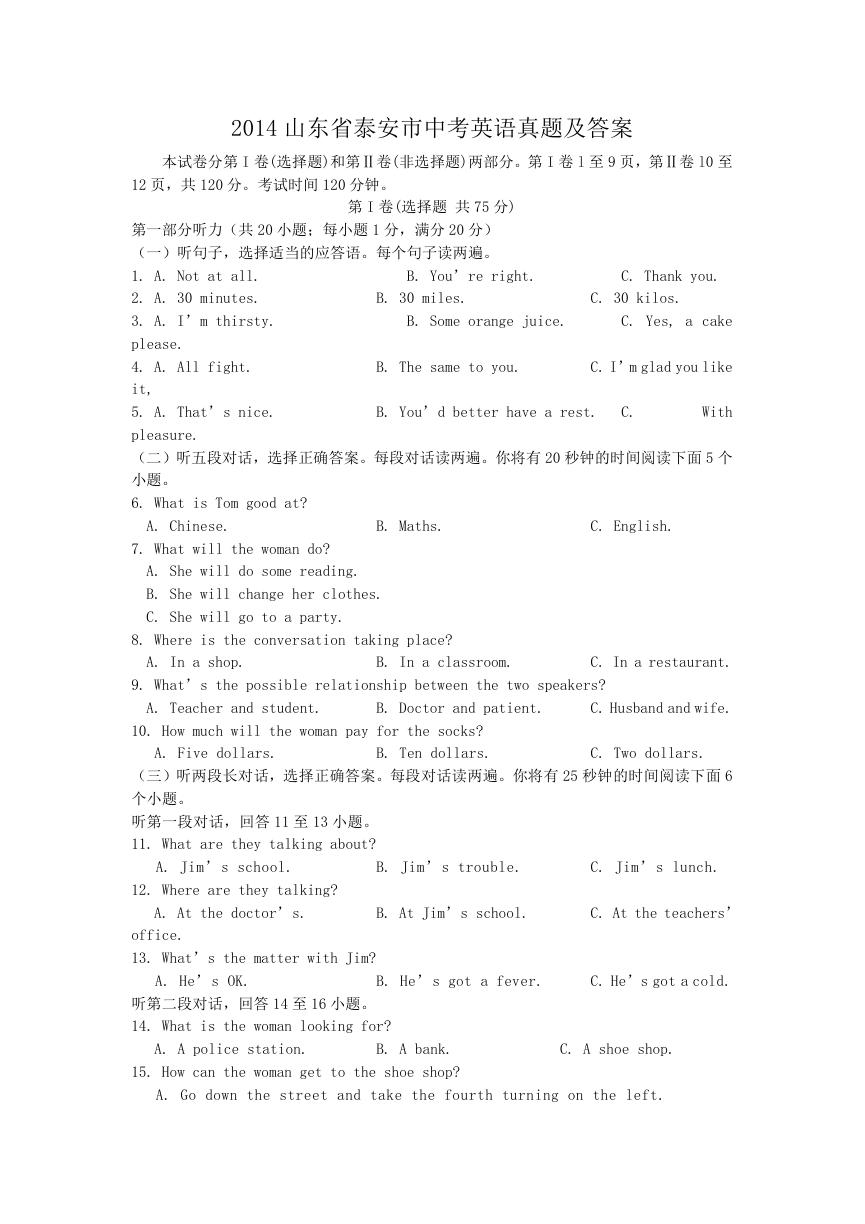
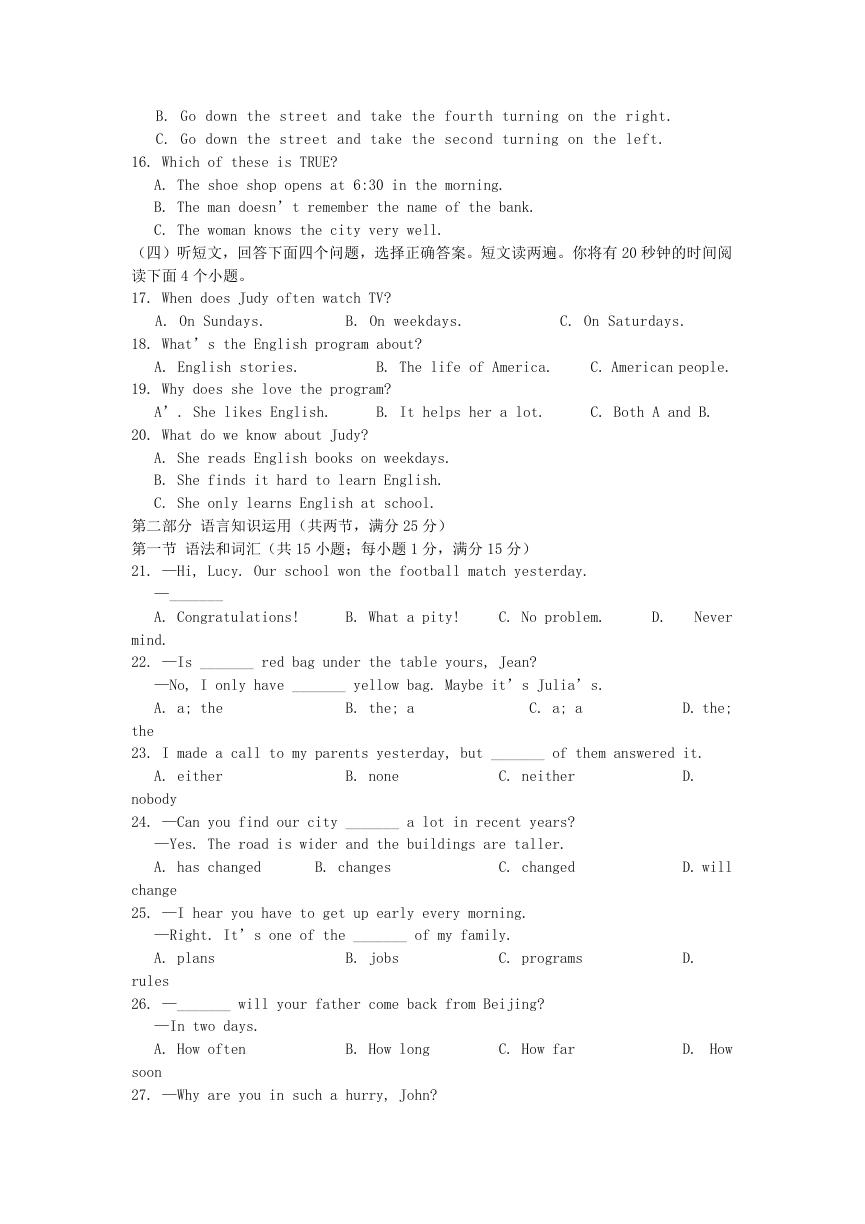
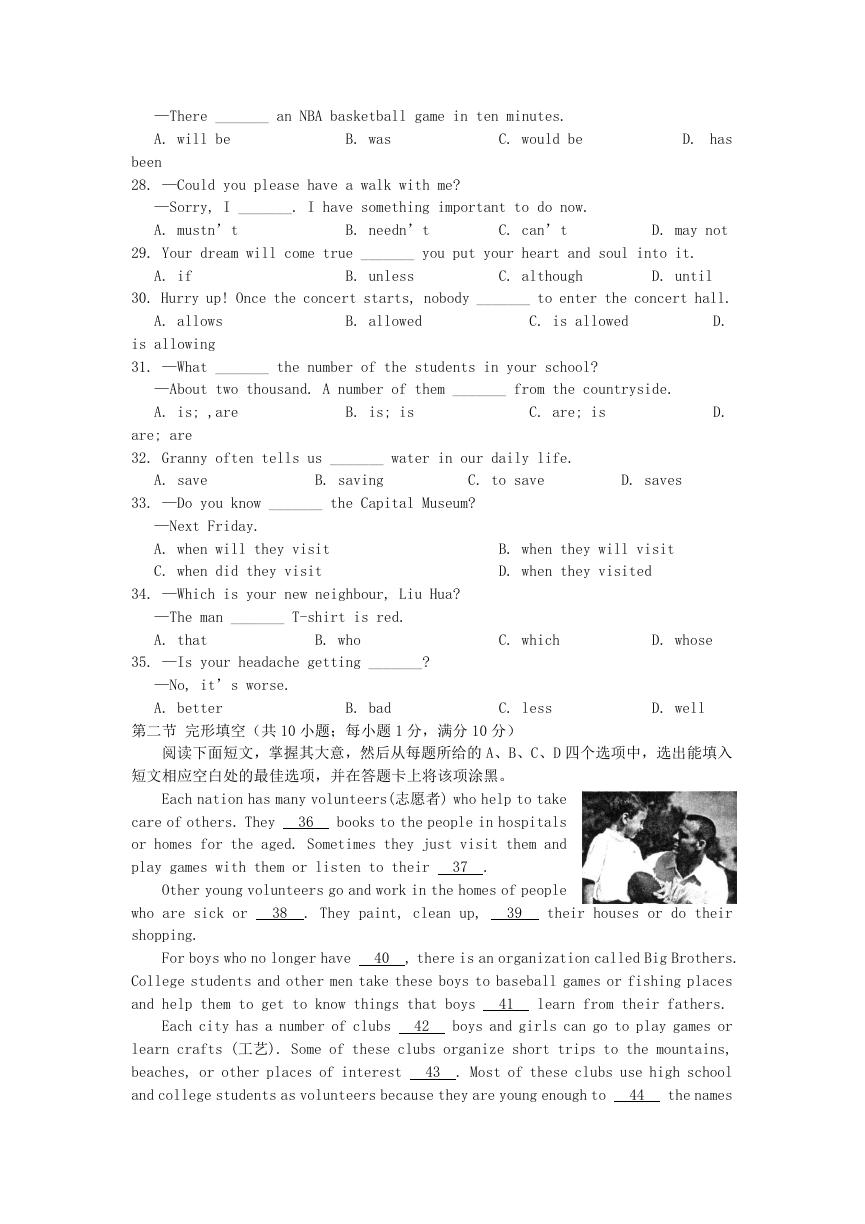
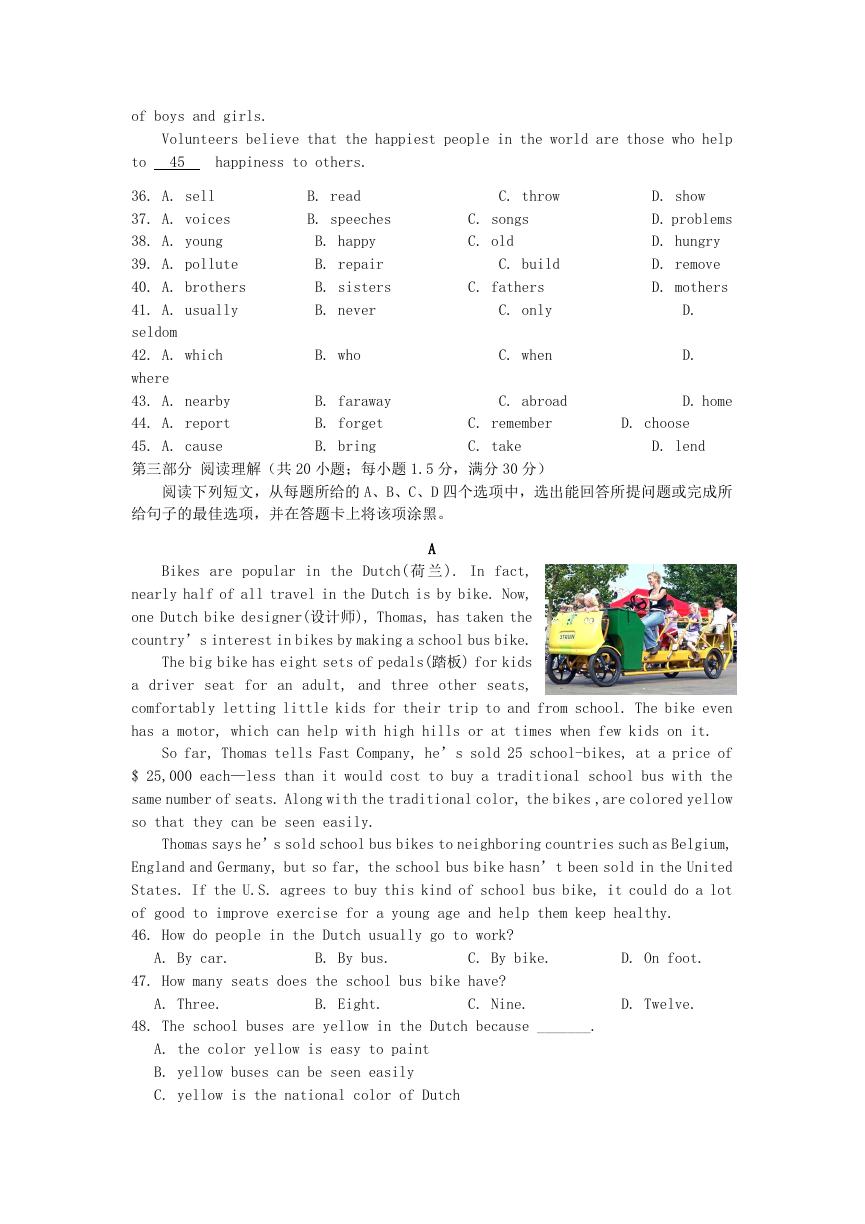
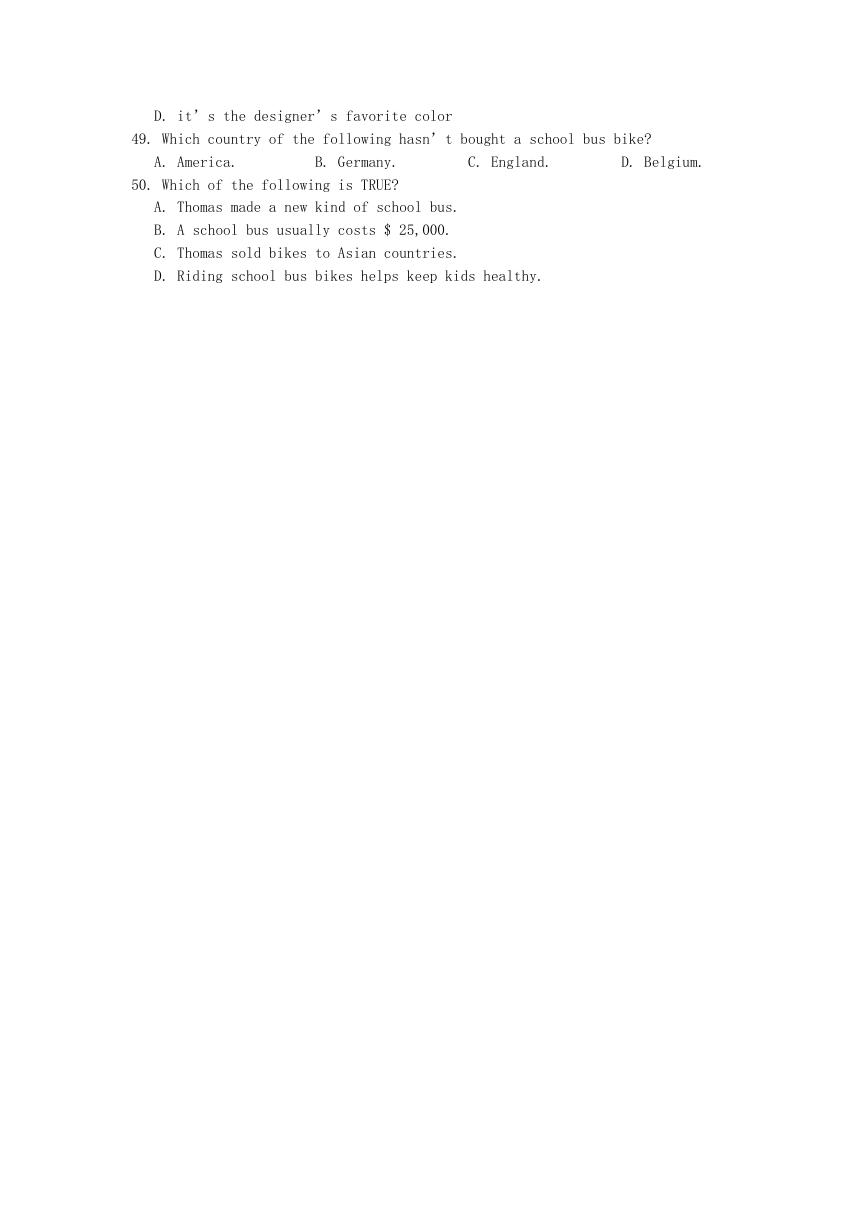
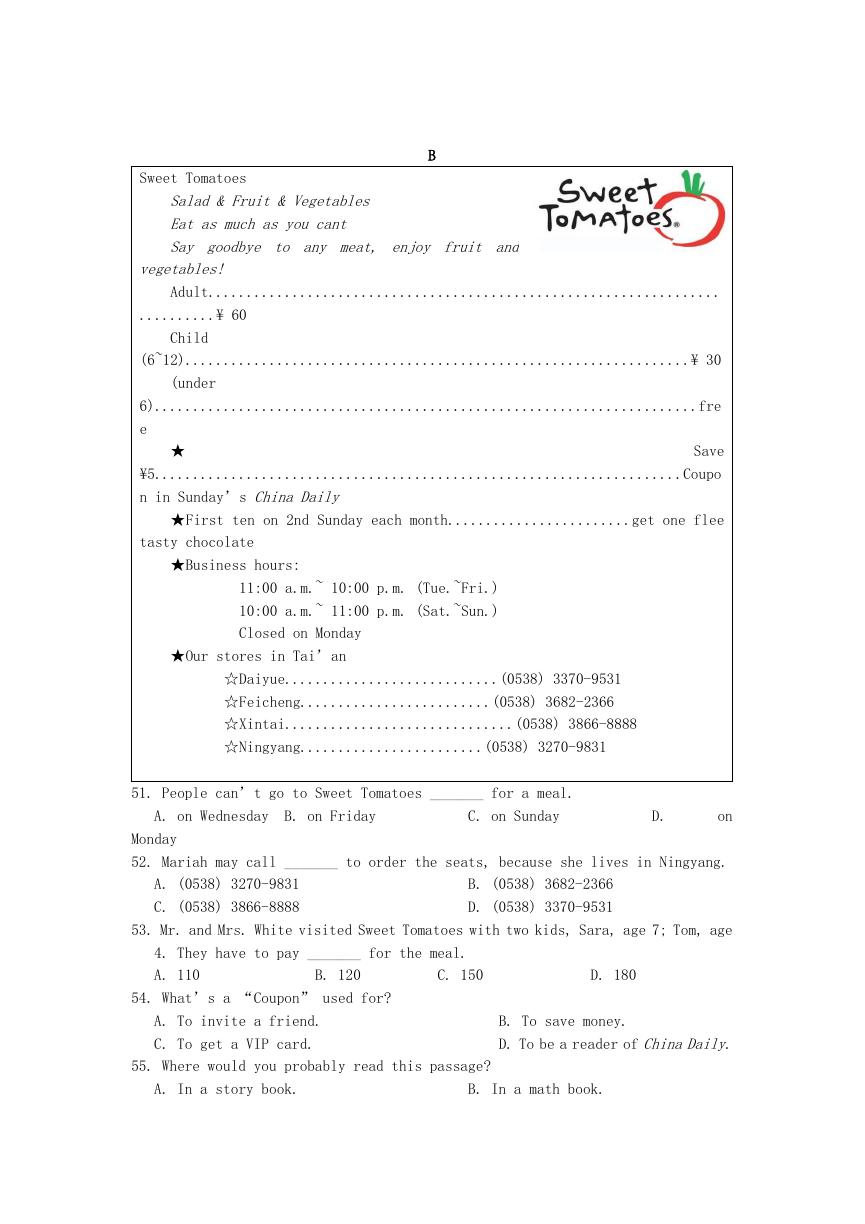
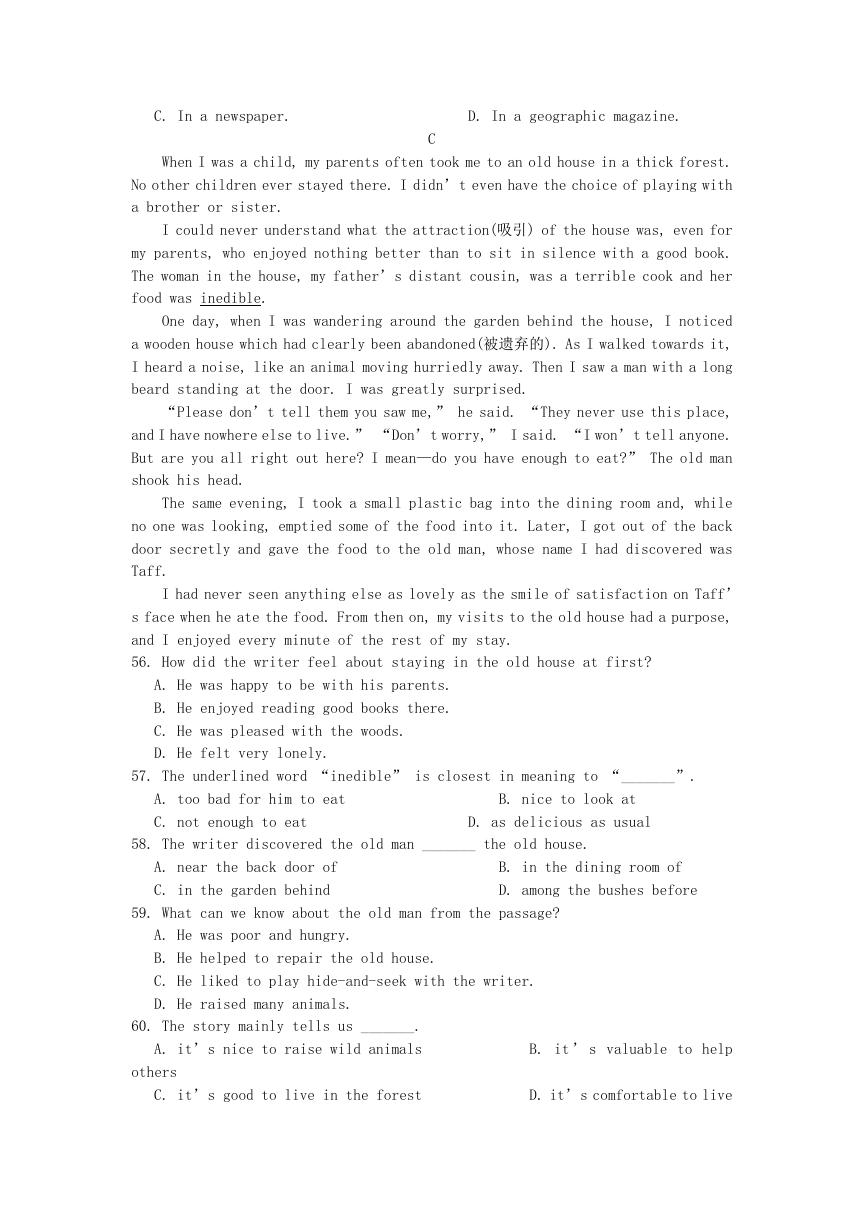
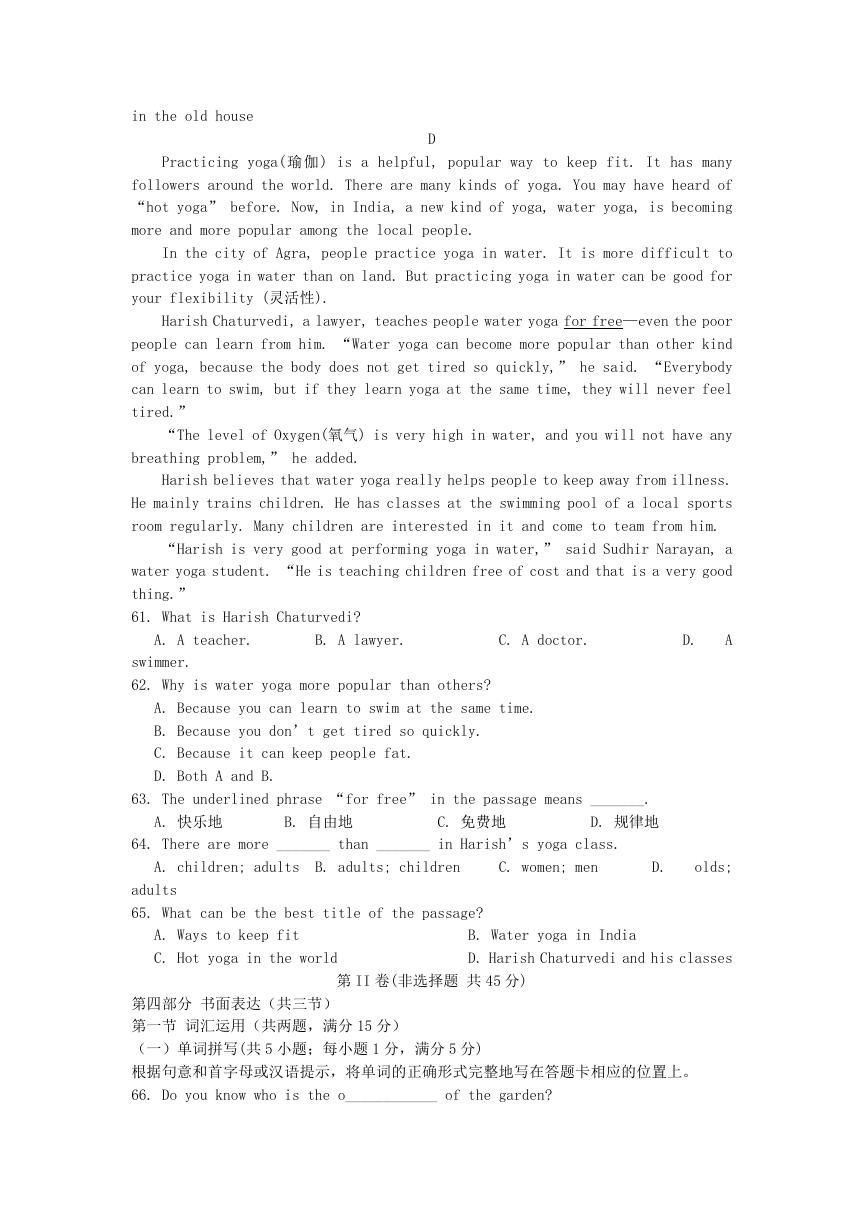








 2023年江西萍乡中考道德与法治真题及答案.doc
2023年江西萍乡中考道德与法治真题及答案.doc 2012年重庆南川中考生物真题及答案.doc
2012年重庆南川中考生物真题及答案.doc 2013年江西师范大学地理学综合及文艺理论基础考研真题.doc
2013年江西师范大学地理学综合及文艺理论基础考研真题.doc 2020年四川甘孜小升初语文真题及答案I卷.doc
2020年四川甘孜小升初语文真题及答案I卷.doc 2020年注册岩土工程师专业基础考试真题及答案.doc
2020年注册岩土工程师专业基础考试真题及答案.doc 2023-2024学年福建省厦门市九年级上学期数学月考试题及答案.doc
2023-2024学年福建省厦门市九年级上学期数学月考试题及答案.doc 2021-2022学年辽宁省沈阳市大东区九年级上学期语文期末试题及答案.doc
2021-2022学年辽宁省沈阳市大东区九年级上学期语文期末试题及答案.doc 2022-2023学年北京东城区初三第一学期物理期末试卷及答案.doc
2022-2023学年北京东城区初三第一学期物理期末试卷及答案.doc 2018上半年江西教师资格初中地理学科知识与教学能力真题及答案.doc
2018上半年江西教师资格初中地理学科知识与教学能力真题及答案.doc 2012年河北国家公务员申论考试真题及答案-省级.doc
2012年河北国家公务员申论考试真题及答案-省级.doc 2020-2021学年江苏省扬州市江都区邵樊片九年级上学期数学第一次质量检测试题及答案.doc
2020-2021学年江苏省扬州市江都区邵樊片九年级上学期数学第一次质量检测试题及答案.doc 2022下半年黑龙江教师资格证中学综合素质真题及答案.doc
2022下半年黑龙江教师资格证中学综合素质真题及答案.doc